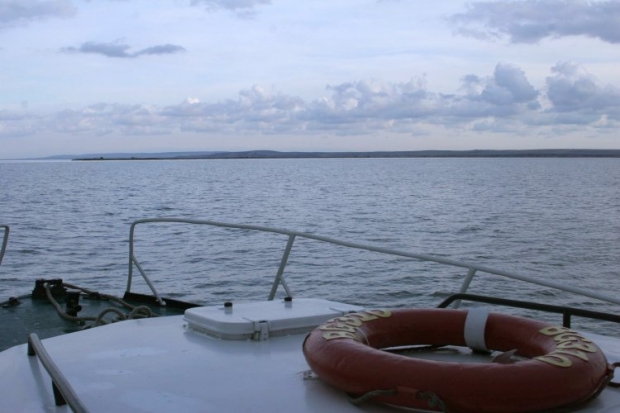
Moscow and Kyiv Respond to German Proposal on the Kerch Strait and Azov Sea (Part One)
Publication: Eurasia Daily Monitor Volume: 16 Issue: 6
By:

The German government has submitted a revamped proposal for Russia to “ensure” unimpeded shipping through the Kerch Strait and Azov Sea, where Russia’s de facto control is usurping Ukraine’s rights. Berlin’s offer centers on international monitoring of the safety of navigation there (see EDM, January 21, 2019).
Berlin’s new pitch takes onboard Moscow’s objections to the previous German proposal last December (2018). At that point, Russia rejected: a) Berlin’s suggestion to assign the Organization for Security and Cooperation in Europe’s Special Monitoring Mission in Ukraine (OSCE SMMU, active in Donbas) to also conduct the proposed monitoring of the Azov Sea and Kerch Strait; b) Berlin’s suggestion to discuss the proposed maritime monitoring within the “Normandy” diplomatic forum (Germany, France, Russia, Ukraine); c) Berlin’s suggestion that the maritime monitoring should encompass both the Kerch Strait and the Azov Sea, without differentiating between the two in terms of access.
German Chancellor Angela Merkel, who had initiated the December 2018 proposal, and whose office negotiated it with Moscow, bowed to Russia’s rejection of those points (and possibly some undisclosed ones). Berlin did accept Moscow’s suggestions that: a) any maritime monitoring should be only conducted by German and French observers; b) their mandate be shaped on that tripartite basis (not in the OSCE and not in the Normandy forum); c) more conditionalities be placed on the monitors’ access in the Kerch Strait than in the Azov Sea; and d) the monitors should watch and report on the (safe) passage of ships.
The German government agreed to re-start the bilateral negotiation with Moscow on those Moscow-defined premises. Yet some potential leeway for negotiation, albeit narrowly, remained (see EDM, December 13, 2018).
On January 18, 2019, Germany’s Foreign Minister Heiko Maas presented the revised-down proposal to his Russian counterpart, Sergei Lavrov, in Moscow (see EDM, January 21, 2019). Berlin’s concessions at Russian insistence signify that: a) bypassing the OSCE (warts and all) in favor of a German-French mission would exclude the United States and other pro-Ukraine countries from negotiating the monitors’ mandate; b) bypassing the “Normandy” forum (again, warts and all) in favor of a German-French-Russian negotiation on the mandate would exclude Ukraine itself from shaping that mandate, and negate Ukraine’s legal titles in that process; c) the proposal seems implicitly to accept Russia’s differentiation between the Kerch Strait (claimed as fully sovereign Russian territory following Russia’s seizure of Crimea from Ukraine) and the Azov Sea (which Russia deems a Russian-Ukrainian shared internal water); and d) the proposal focuses on safety of navigation more than on freedom of navigation, potentially sacrificing principle to expediency, even if the proposal’s authors have no way to enforce anything seemingly gained through expediency.
That much could be gleaned from Maas’s snippet-style press conference remarks in Moscow and Kyiv, as well as from Ukrainian Foreign Minister Pavlo Klimkin’s more candid public comments after learning it from Maas post factum in Kyiv (Interfax, RIA Novosti, Ukrinform, Ukrainska Pravda, January 18, 2019).
Those points also corroborate the gist of Merkel’s December 2018 remarks (see above) foreshadowing the content of a revised-down proposal. To be sure, Berlin’s concessions go only half way in some aspects. While Moscow wanted Kyiv to be excluded from this negotiation, Maas compromised: he did consult with Kyiv, but only after presenting Berlin’s proposal to Moscow; and he did say that a decision reached between Berlin and Moscow would have to be cleared with Ukraine afterward. Ambiguous, too, was Maas’ remark in Moscow that the monitoring group should “certify” (“dokumentirovat’”) the fact of free passage of ships, rather than upholding the principle of freedom of navigation. In his concluding joint news conference with Klimkin in Kyiv, Maas adjusted his remarks somewhat, undoubtedly in response to Klimkin’s comments on the proposal.
Klimkin registered Ukraine’s concerns during the joint press conference with Maas and, separately, in publicized comments to the Ukrainian Foreign Affairs Ministry’s assembled staff. Ukraine would welcome an international presence in the Kerch Strait and the Azov Sea. However, Russia would “undoubtedly try to manipulate this mission” in ways that would signify acceptance of the Russian occupation. The proposed mission should not give Russia such opportunities. The mission should not even hint at acknowledging a “border” (between Ukraine and the Russian-occupied Crimea), and should not apply to Russia for admission of the mission’s members to the occupied territory in the Kerch Strait (i.e., the Strait’s Crimean shore and the legally Ukrainian side of the water surface). The proposed mission should not be based in Russian-occupied Crimea, and should not operate through the Kerch Port Authority or acknowledge it (this point responds to Moscow’s insistence that monitors should accept pilotage and other services from the Kerch Port Authority, which Russia has usurped from Ukraine). Klimkin termed such concessions as unacceptable.
Highlighting the distinction between “safe navigation” and “free navigation,” Klimkin urged that any monitoring not be limited to the physical movement of ships or the provision of pilotage. The proposed mission must affirm the principle of freedom of navigation under international norms in the Kerch Strait and Azov Sea: “This is a basic prerequisite to our consideration of any monitoring mission” (UNIAN, Ukrainska Pravda, Ukrinform, Interfax-Ukraine, January 18, 19, 2019).



